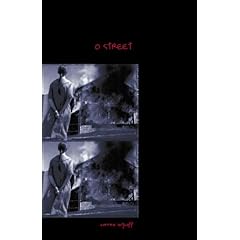« older | Main Largehearted Boy Page | newer »
January 24, 2007
Book Notes - Corrina Wycoff ("O Street")
Corrina Wycoff has presented a strong collection of interrelated stories in her debut collection of short fiction, O Street. The series follows her protagonist from her troubled teem years into single motherhood, and her drive through desperate times is truly an inspiration.
The book's official release date is April 2, 2007, but the book can be purchased directly from the publisher, or pre-ordered through its distributor or other online retailers.
In her own words, here is Corrina Wycoff's Book Notes entry for her debut collection of short fiction, O Street:
I’ve spent the past many years teaching English at a community college, writing fiction at home, and living as a single mom. In short, I am remarkably uncool. I cook dinner at 5:30 in the afternoon, laugh like a crazy person at the NPR Saturday morning quiz show “Wait, Wait Don’t Tell Me” and drive a sedan that would make anyone’s grandmother proud. During the 2004 primaries, I campaigned for dead-last Democratic contender Dennis Kucinich. I own four cats, and, just last month, spent seven hours trolling Seattle for a pharmacy that would reconstitute human thyroid medication for a 7 pound feline. Last year, my students had to define the word “emo” for me, and my twelve-year-old son often begins sentences with, “Duh, Mom.”
So, this assignment is daunting. Sure, I like music. I listen to it. I’m interested in it, but I’ve never been asked to write about it. I’ve never even been asked to bring CDs with me to a party. In fact, when I was an awkward late-1980s teenager with a penchant for 60s folk music and Sondheim showtunes, I was so notoriously bad at making mix tapes that, many years later, my high school best friend inquired whether my adult love interest had yet “survived the mix”. Still, when I was invited to imagine a playlist that would hypothetically accompany my first book, I imagined one (sans Sondheim) cool or not.
My book is called O Street; it's a collection of linked stories that follows one main character from her childhood through her mid-30s. The book is fiction, but it is based on a political truth: Single mothers fall through the cracks in this country, and the cracks grow in proportion to these women's additional economic challenges, making inaccessible the so-called American Dream. The book touches on poverty, addiction, a society that's skewed against the poor, and the impossibility of fully transcending the psychological patterns of childhood.
In the book’s first story, Beth, the main character, returns to her hometown claiming to have outrun the mother whose behavior and ambivalence still define her. Although the narrative of The Decemberists’s “The Engine Driver” (Picaraesque, 2005) isn’t an exact match, the song mournfully describes the power of both bloodlines and a loved one’s inability to return that love. The second story is told from the point of view of Beth’s young, single mother, Angela, who struggles without emotional or family support. The plight of the American poor is intelligently articulated in Michael Franti and Spearhead’s, “Crime to be Broke in America” (Home, 1994) and The Dead Kennedys’s Jonathan Swift-like satire “Kill the Poor” (Mutiny on the Bay, 2001). The collection’s next three stories describe Beth’s desperate childhood affection for her wounded mother. The Prayers and Tears of Arthur Digby Sellers’s beautiful, eerie single “Lisa” (2005 winner of the Esopus Magazine contest) details the consequences of failing to outgrow childhood fantasies and attachments. Themes of powerlessness also appear in “Snakes and Martyrs” from TV on the Radio’s 2006 release Return to Cookie Mountain and in Janis Ian’s spooky, metaphoric “Queen Merka and Me” (Songs for all the Seasons of Your Mind, 1968). Finally, Portishead’s famous “Numb” (Dummy, 1994) serves as a banshee cry of loneliness and despair.
In the second half of the book, Beth, now an adult, unwittingly perpetuates some of the patterns of her childhood while consciously ending others. Beth’s growing awareness is similar to the narrator’s in Devandra Banhart’s “Now that I Know” (Cripple Crow, 2005). Her awareness has limitations, however, and in the next two stories, Beth reproduces her own childhood circumstances by becoming an impoverished single mother herself. Three songs come to mind: Melanie’s “Citiest People” (Candles in the Rain, 1970), The Unseen’s primal scream of a song, “In the City” (Lower Class Crucifixion, 1998), and Judy Collins’s “Born to the Breed” (Judith, 1975). The last of these—with its desperate bravado, tenderness, and despair—could serve as the young, poor, underprepared single mother’s anthem.
The collection’s penultimate story is told from the point of view of Beth’s pre-adolescent daughter, Kerry, who divides her time between Beth and a middle class father and stepmother. At her father’s house, Kerry tries to negotiate an environment marked by loss, secrets, and perpetual distrust. (I thought of the Cold War Kids’s song “We Used to Vacation” from Robbers and Cowards, 2006.) The book ends with Beth, age thirty-five, trying to forgive the mother who never loved her and trying to love the daughter who feels like a stranger to her. There’s no more haunting, beautiful “circle of life” song than Laura Nyro’s “And When I Die” (More Than a New Discovery, 1967) which implies—as I hope my book does—that our children replenish all we are and, more importantly, all we could ever have been.
see also:
the book's website
Emerging Writers Network review of "Visiting Mrs. Ferullo"
Previous Book Notes submissions (authors create playlists for their book)
Note Books (musicians discuss literature)
52 Books, 52 Weeks (2007 Edition)
52 Books, 52 Weeks (2006 Edition)
52 Books, 52 Weeks (2005 Edition)
52 Books, 52 Weeks (2004 Edition)






